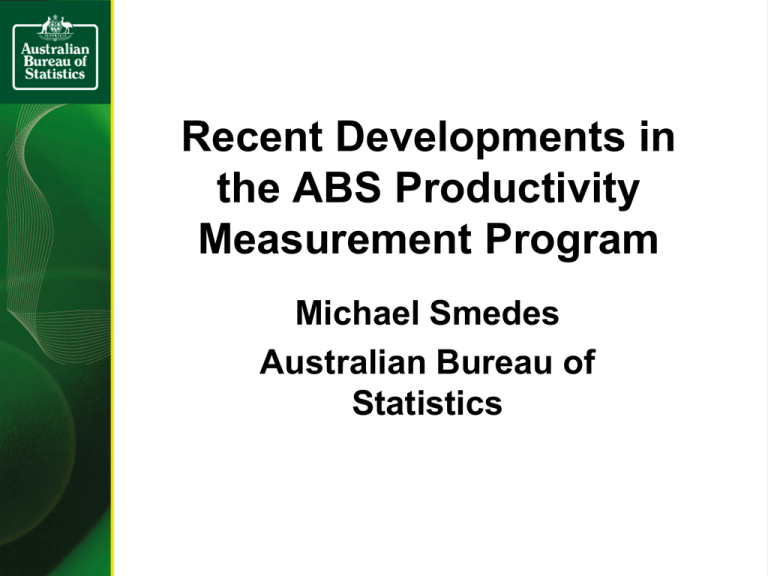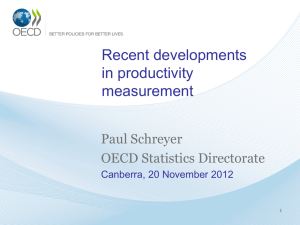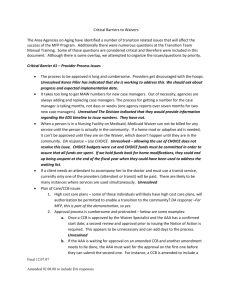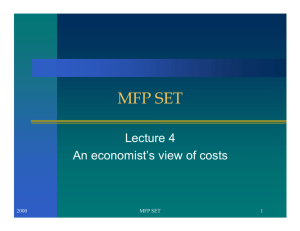Recent Developments in the ABS Productivity Measurement
advertisement

Recent Developments in the ABS Productivity Measurement Program Michael Smedes Australian Bureau of Statistics Outline •Overview of the ABS multifactor productivity statistics •Recent progress •Challenges and data gaps •Opportunities for further improvements and new stats Multifactor Productivity Measurement Framework • Solow (1956) new classical growth accounting framework • Modern growth accounting framework – Refined measures of capital and labour input (Griliches & Jorgenson 1967) – Index number theory (Diewert 1976) – Industry level MFP statistics (Jorgenson et al. 1987) • International standard and best practice – The release of BLS (1983) MFP statistics – OECD Productivity Manual (2001) Brief History of ABS MFP Statistics • The ABS market sector MFP statistics – Research on capital stock – First information paper in 1989 – Occasional paper on productivity measurement issues by Aspden (1990) – Regular release of market sector MFP statistics from 1994 – Incorporated into ASNA from 1999 • The ABS industry level MFP statistics – Research paper by Zheng (2005) – ABS information paper and release of industry level MFP datacube in 2007 Key Activities of the ABS Program • Compiling aggregate and industry level MFP statistics – Headline MFP measures for ASNA – Industry level MFP data cube • Conducting ongoing research – Perennial measurement issues – Hard-to-measure industries Recent Changes in ABS MFP Statistics • Implementation of new international statistical standards – ANZSIC06 – SNA08 • Expanded definition of market sector • Two aggregate MFP measures – New expanded market sector measures released in ASNA – 12 Selected industries MFP statistics released in industry level MFP data cube Growth Accounting Analysis for the Market Sector (%) 1998-99 to 2003-04 2003-04 to 2007-08 1998-99 to 2007-08 Output growth 3.5 3.7 3.6 Contributions to output growth (hours worked basis) Capital services Hours worked Multifactor productivity 1.7 0.7 1.1 2.6 1.5 -0.5 2.1 1.1 0.4 Contributions to output growth (quality adjusted hours worked basis) Capital services Hours worked Labour composition Multifactor productivity 1.7 0.7 0.3 0.8 2.6 1.5 0.2 -0.7 2.1 1.1 0.2 0.2 Industry Level MFP Statistics: 1994-95 to 2011-12 A Agriculture, Forestry and Fishing B Mining C Manufacturing D Electricity, Gas, Water and Waste Services E Construction F Wholesale Trade G Retail Trade H Accommodation and Food Services I Transport, Postal and Warehousing J Information, Media and Telecommunications K Financial and Insurance Services L Rental, Hiring and Real Estate Services M Professional, Scientific and Technical Services N Administrative and Support Services R Arts and Recreation Services S Other Services Output 4.21 3.30 1.00 1.39 4.94 3.52 3.71 2.57 3.71 4.16 5.68 2.27 4.82 2.83 3.52 2.31 Capital 0.60 5.41 1.38 2.88 1.25 1.73 1.31 0.78 1.67 3.77 1.93 4.59 1.10 0.63 1.95 2.07 Labour -0.52 1.09 -0.69 1.04 2.22 0.32 1.03 1.01 0.94 0.24 0.97 1.22 3.18 2.57 1.74 0.56 MFP 4.13 -3.20 0.31 -2.52 1.47 1.47 1.37 0.77 1.11 0.15 2.78 -3.54 0.55 -0.36 -0.17 -0.33 Key Research on Hard-to-measure Industries • Research into Mining Industry MFP – Research paper on natural resources input presented at 2010 EMG workshop – Research paper on adjusting lags between investment and delivery of capital services presented at 2012 ACE • Examining MFP measures for Utilities industry – Report presented at 2011 PMRG workshop • Solving puzzles for Rental, Hiring & Real Estate Industry – Report presented at 2010 PMRG workshop • A feasibility study on developing MFP statistics for Health Care and Education industries – Report presented at 2010 PMRG workshop Research on Measurement Issues • Integrating market sector MFP with industry level MFP stats – Paper on industry sources of Australia’s productivity slowdown at Second World KLEMS Conference at Harvard University – Incorporated into the upcoming updated ASNA CSM • Developing measures of labour compositional changes at the industry level – Report presented at 2012 PMRG workshop – Incorporated into the upcoming updated ASNA CSM • Capital and labour shares • Alternative methods for splitting gross mixed income • Measurement of capital input – Sensitivity analysis of alternative assumptions and approaches Challenges and Data Gaps • Nonmarket industries • Quality changes, in particular for services related industries • Continuing debate about the output measurement for Financial & Insurance Services Industry • Business survey based employment information • Capital investment by asset types at the industry level • Natural resources and environment Quality Dimensions of Productivity Statistics • The ABS information paper ‘ Quality Dimensions of Australian National Accounts’ establishes a few criteria on assessing economic statistics • Market Sector LP Stats rated as A, and MFP as B due to measurement issues with capital input • Updated National Accounts CSM to be released in December 2012 Opportunities for Improvements and Addressing Data Gaps • Developing a full production account in both current price and volume (based on supply-use tables) to support KLEMS analysis • KLEMS model of industry level MFP measures – Separate estimates of energy, material and services – Gross output based and the role of intermediate input • Developing MFP measures at 2 digit ANZSIC level • Construction of a set of labour accounts to improve labour input measures • Possible improvements to capital services including survey on asset lives and industry assets splits Questions ?











